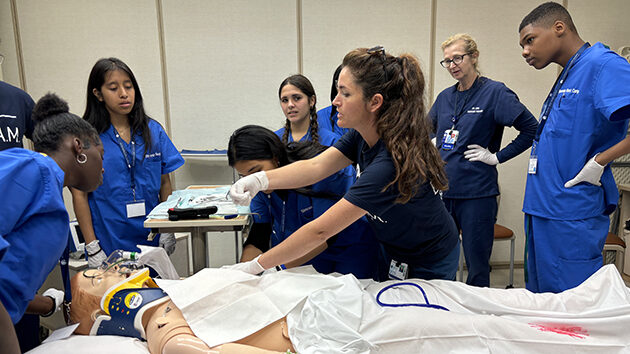Workforce Diversity Key to Mission

When Monika Prifti joined Albany Medical Center three years ago, she brought her strong work ethic and contagious smile. But as a recent immigrant from Albania, she wanted to strengthen her language skills to connect better with her customers at Albany Medical Center’s Choices Cafe.
She was surprised and delighted to find that her new employer offered English as a New Language classes on-site for recent immigrants like her.
“My teacher’s guidance and encouragement have not only helped me improve my language skills but also be a better communicator in my work,” Prifti said.
“Albany Med is not just a workplace to me,” she said. “It’s a big family that supports each other, helps each other, and celebrates our achievements. I am truly happy and proud to be part of it.”
“Being here, working here, this is a dream,” her colleague Shobha Gautam said. Gautam and her husband left Nepal more than a decade ago with their two children after “winning” a visa lottery. Now they both work at Albany Medical Center, where she is known for her compassion and kind words for colleagues and customers.
James Brisbin, ESL teacher and manager of the hospital’s Aramark Career Center, which fills support service jobs, said, “You can achieve almost anything here. I’m proud of the fact that Albany Medical Center has opened its arms to so many.”
Currently, Albany Medical Center employees come from 80 different countries, represent all races, genders, and religions, and span five generations. As the region’s largest private employer and only academic medical system, Albany Medical Center’s initiatives to redouble its commitment to diversity, equity, and inclusion help shape the health care experience of patients throughout the Albany Med Health System.
For this reason, Albany Medical Center was named as one of America’s Greatest Workplaces for Diversity 2024 by Newsweek and Plant-A Insights Group—a designation that highlights the organization’s dedication to creating an environment where employees from different walks of life feel respected and valued. Forbes also designated Albany Medical Center one of the best employers in New York State based on employee surveys focused on job satisfaction.
“With our workforce continuously becoming more and more representative of our patients, it is easier for all members of our community to feel welcome,” said Boahema Pinto, MD, dean of Diversity, Equity, and Inclusion at Albany Medical College, and an emergency physician. “When you speak the same language, or look like, or have a common identity with your patients, barriers come down and trust comes a little easier.”
As dean, Dr. Pinto educates medical students and faculty on caring for diverse and vulnerable patient populations and leads efforts to increase workforce diversity and inclusion. Through service learning, the College’s medical students connect with the local community, and help address some of the challenges facing underserved populations—social determinants of health. The students spend time with local agencies and organizations focused on solving health and social justice issues. The goal of the program is to instill compassion and encourage a commitment to community-based health interventions. While the College requires 40 hours of service, many students go well beyond and continue volunteer activities.
Another College program, EMmersion Bootcamp, brings area high school students from underrepresented communities into the hospital to highlight the many career options available in medicine—bolstering the next generation of health care professionals. After four years, nearly 100 students have participated: some have come back as “interns” or to shadow specific positions; and many have indicated that they have changed their career goals to consider roles in health care.
“Many of these students have never thought of themselves as being able to be doctors or nurses or other health care professionals,” Dr. Pinto said. “Seeing what it’s like to work here, alongside other people who look like them or have similar backgrounds, might be the difference in choosing to join the health care field.”
Partnerships with local organizations like the New York State Black Nurses Coalition, Girls, Inc., Capital District Latinos, the NAACP, and the YMCA also create opportunities to expand recruitment of underrepresented populations while also building trust with some members of the public who may have traditionally been reticent to seek care.
The Center for Disability Services (CFDS) also has a longstanding partnership with Albany Medical Center. CFDS clients were among the first in the region to be vaccinated against Covid-19 when the two organizations created a model that ensured individuals with intellectual and developmental disabilities were not left behind. Medical Center staff also established a blood draw lab to accommodate their needs in a comfortable, familiar, and easily accessible setting. Albany Medical College students participate in the CFDS Palz Program; it connects students with residents of local group homes for experiential learning and companionship.
“Speaking with kids and families at Albany’s elementary schools and working with organizations like the South End Children’s Café or the Center for Disability Services, we’re showing residents that we aren’t just in their community, we are part of their community,” said Charles M. Day, vice president of security services and director of community engagement. “Many people don’t think about their health until it’s too late. We want to change that.”
For example, Albany Medical Center worked with a neighborhood barbershop to reach a larger population of Black men, a key audience for outreach on hypertension—a disease that affects 55 percent of Black adults.
“By meeting people where they are and truly connecting with them, we can start critical dialogues about health and social determinants, provide education or even screenings, and ultimately improve health outcomes,” Day said.